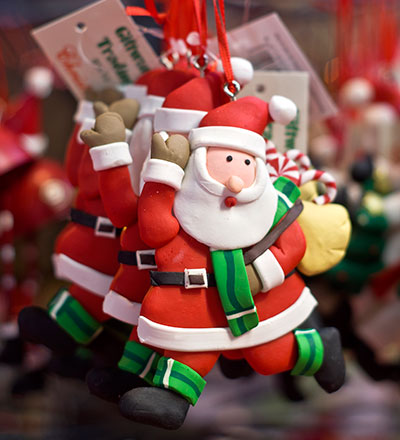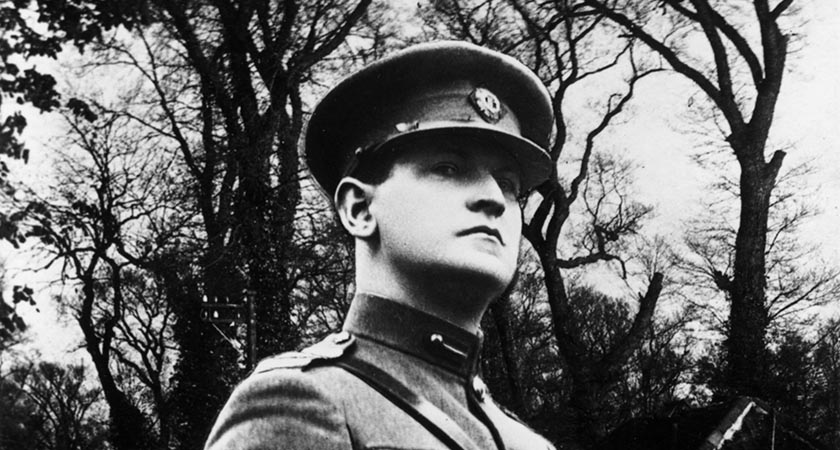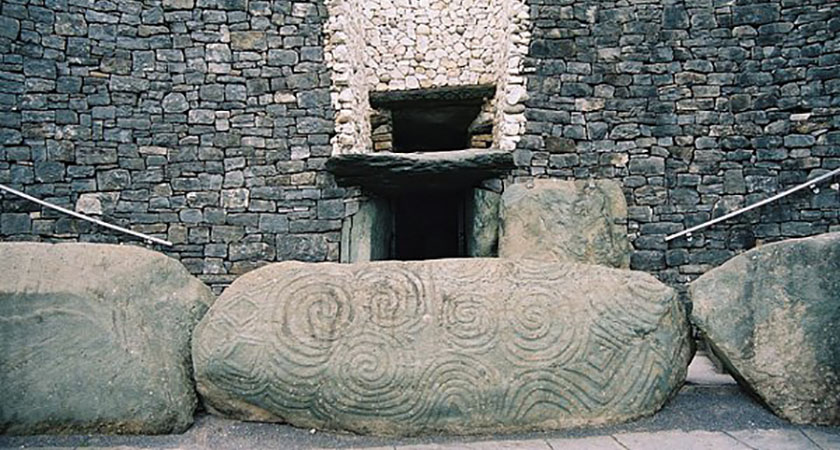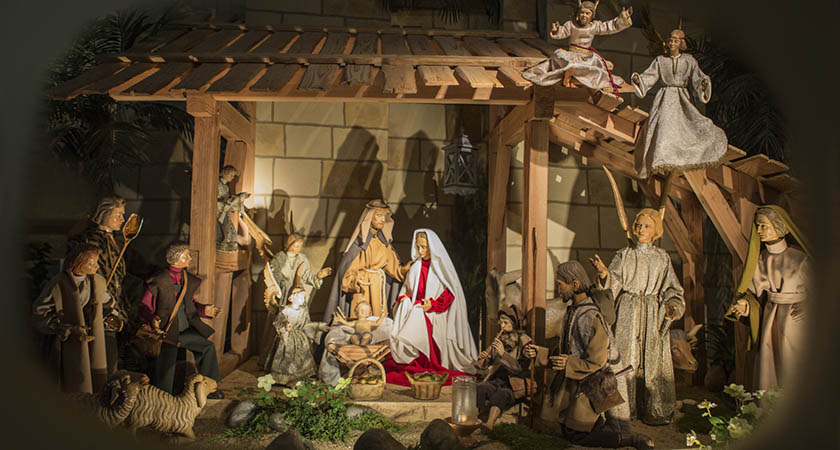1. Advent
Advent — you may be surprised to learn — marks the start of the Church year. It begins the Sunday nearest to the feast of St Andrew the Apostle on November 30.
 2. Feast Day of St Nicholas — December 6
2. Feast Day of St Nicholas — December 6
Many people mistakenly think that the feast day of St Nicholas is on Christmas Day. But no, it’s on December 6.
St Nicholas, of course, gave his name to Santa Claus, via the Dutch name Sinterklass.Santa, the patron saint of Russia, Greece, Galway City and merrymaking, is buried in Myra, Turkey. Maybe.
A persistent local legend in Co. Kilkenny claims that the earthly remains of St. Nicholas can be found in the ruined church of an abandoned medieval town, Newtown Jerpoint, in the shadow of Jerpoint Abbey. A very strange grave shows the effigy of a cleric overlooked by two stone heads. Locally, the effigy is reputed to be that of St. Nicholas, with the heads depicting the two crusaders who brought the remains of the bishop back to Kilkenny.
The bones of the story are that a band of Irish-Norman knights from the locality journeyed to the Holy Land during the Crusades. After much derring-do, they seized the remains of St. Nicholas en route home from Jerusalem to Jerpoint.
A few years ago a tree fell on the Kilkenny grave and cracked it in two. You’ll have already guessed — it was a Christmas tree.
3. The signing of the Anglo-Irish Treaty — December 6, 1921
On December 6, 94 years ago, Michael Collins sat down to parley with the British. Many believe he got the best deal possible — a partitioned Ireland. At that stage it would have been impossible to secure either full republican status or a united Ireland; the Brits were looking over their shoulders at an increasingly restless Empire, and they couldn't be seen to be caving in too easily. At the conclusion of negotiations, Collins declared in very un-Christmassy fashion: “I have just signed my own death warrant.” Mind you, as the father of guerrilla warfare and someone who put paid to several British agents during the War of Independence, he was always quite likely to say, “I have just signed your death warrant.”
4. A right royal to do— December 10, 1943
In the wake of the abdication of Edward VIII, the Dáil passed legislation removing the King from the Irish Constitution and abolishing the position of Governor General. King Edward, of course, was no loss. According to writer Craig Brown, he was remembered by one contemporary as always having “something of riveting stupidity to say on any subject”. Irish people fondly waved goodbye to the Royals, saying: "Good riddance and merry Christmas!"
5. A notable birthday extravaganza — December 12
On this auspicious day for Daniel O'Donnell and Sinead O'Connor. Today is also the anniversary of the birth of Frank Sinatra, born in 1915.
6. We're walking in the air — December 12: 1782
The Montgolfier Brothers' hot air balloon first took to the skies in the vicinity of Lyons in 1782.They burned cow dung as the fuel to provide the hot air, thinking it was the smell which propelled them through the air. So successful was this Christmas flight that further additives were introduced to the mix to make it even smellier – such as sulphides and ammonia. Maybe last night's kebab or used underpants went into the flames for all we know. But eventually the centime dropped — it was the hot air, not the pong, driving the enterprise. Which was good news. Otherwise your average no-frills, packed, budget flight home at Christmas would be even smellier than it is now.
7. The first Saturnalia festival — December 16, 497BC
The first Saturnalia was celebrated in ancient Rome. It was a time of great merrymaking and continual partying — which went on until December 23. It is believed to be one of the major forerunners of Christmas. During Saturnalia, the giving of gifts was commonplace. However these seasonal presents were commonly tree branches. Regrettably handing your friends or loved ones a load of oak leaves for Crimbo would not suffice today.
8. The Pogues and Kirsty MacColl appear on Top of the Pops — December 17, 1987
It would be fair to say that Shane MacGowan is not exactly the first person you'd imagine might write the perfect Christmas song. But there it is — along with Jem Finer he produced the greatest seasonal composition since White Christmas. The melancholy lyrics of A Fairytale of New York, which never stray into mawkishness, are expertly set to that most Irish of all dance forms, the Austrian waltz. With a touch of traditional music and a soupçon of punk, it was a winner.
The song eventually reached no. 2 in Britain and the no. 1 slot in Ireland.
9. The winter solstice — December 21
On December 21 a moment of drama is played out at Brú na Bóinne in Co. Meath, and has been for some 5,000 years in a row. At dawn, a pencil of sunlight penetrates the Neolithic burial chamber of Newgrange, lighting it up for twenty minutes — before darkness falls for another year.
The huge structure of Brú na Bóinne built by our forebears is perfectly aligned so that the first rays of the winter solstice sun pierce through a small opening in the chamber's roof and travel nineteen metres along a narrow stone passage to focus on the entrance to the grave. Never mind the Hanging Gardens of Babylon — this is one of the great architectural gems of the world, and one of the great December occasions.
10. The very first Christmas cracker joke? — December 22, 1610
Nuremberg city council issued a notice dated December 22, 1610 that indecent joke items, made by a local wood turner as children's Christmas gifts, had been confiscated. Was this the forerunner of the Christmas cracker joke? It’s not known what the Nuremberg pranks were.
11. Christmas Day – December 25
It’s Christmas! You can verify this on www.isitchristmas.com in case you’re in any doubt. In an extravaganza of positivity that almost rivals Newgrange's light show, for twenty four hours the website shows a gigantic yes — before returning to the 'No' for the rest of the year. Today you can also marvel at the utter serendipity of the man who co-wrote Fairytale of New York celebrating his birthday today — Shane MacGowan. It’s also the anniversary of the birth of Isaac Newton (1642), and Mohammad Ali Jinnah (1876), the founder of Pakistan — although he rarely commentated on the fact or referred to himself as a ‘Christmas baby’.
12. St Stephen’s Day – December 26
Disappointment and St Stephen’s Day go hand in hand, they say. But it can be one of the most peaceful days of the festive season, with only one sobering thought to cloud your agenda — you’ve now only got six days left to carry through on this year’s New Year’s resolutions.





